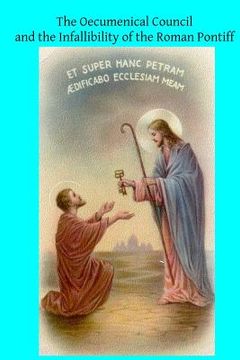Reseña del libro "The Oecumenical Council and the Infallibility of the Roman Pontiff (en Inglés)"
Henry Edward Cardinal Manning wrote this prior to the First Vatican Council. Cardinal Manning lays out the reasons both for and against defining the infallibility of the Pope. The first reason he gives in favor of the definition is: "That if the Episcopate, priesthood, and people, are, with so few exceptions, unanimous in receiving with submission and assent the, Pontifical Acts, there would not only be no risk in promulgating such a decree, but they would rejoice to see the formal reason of that Catholic submission justified by an authoritative definition; or if the number of those who refuse submission be more numerous, a necessity thereby is proved for the declaration of the truth." Later on he gives us some interesting points: "'Both Catholics and heretics agree in two things; first, that the Pontiff, even as Pontiff and with his counsellors, or even with a General Council, may err in controversies as to particular facts, which chiefly depend on the information and testimonies of men; secondly, that. the Pontiff, as a private doctor, may err even in questions of faith and morals; and that from ignorance, as at times happens to other doctors. Next, all Catholics agree in two other things, not indeed with heretics, but among themselves. First, that the Pontiff, with a General Council, cannot err in framing decrees of faith, or general precepts of morals. Secondly, that the Pontiff alone, or with his own private Council, whether he may err or not, in deciding anything in a dubious matter is, nevertheless, to be obediently listened to by all the faithful. These points so disposed of, only four opinions remain. The first is, that the Pontiff, even as Pontiff, although he define a doctrine with a General Council, may be a heretic himself, and teach heresy. . . . This is the opinion of all heretics, especially of Luther and Calvin. The second, that the Pontiff, even as Pontiff, may be a heretic, and may teach heresy if he define without a General Council. This is the opinion of Nilus and the later Greeks, of Gerson, Almain, and others. 'The third, that the Pontiff cannot in any way be heretical, or publicly teach heresy, even though he alone frame a definition: which is the opinion of Pighius in book iv., chap. 3, of the "Ecclesiastical Hierarchy. " The fourth, which lies between these extremes, is, that the Pontiff, whether personally he can be a heretic or no, cannot, in any event, define anything heretical to be believed by the whole Church. " This is the most common opinion of nearly all Catholics," as S. Thomas says. Of these four opinions, the iirst is heretical: the second not proprie heretical, for we sec still that it is tolerated in the Church; yet it appears to be altogether erroneous, and proximate to heresy.' It is to be borne in mind that Bellarmine wrote this before the Four Articles of 1682 had been framed or censured. The third opinion is probable, but not certain. The fourth opinion is most certain, and to be asserted. Bellarmine in later years reviewed his 'Controversies, ' and wrote of this point as follows: - This opinion is more rightly the common judgment of Catholics; for opinion implies uncertainty, and we hold this judgment to be certain.' And again, 'I said that the opinion of those who teach that infallibility of judgment resides not in the Pope, but in the General Council, is not plainly heretical, but erroneous and proximate to heresy., Ve do not, indeed, venture to pronounce that opinion plainly heretical, because they who follow it have, neither they nor their books, been condemned by the Church. Nevertheless, it seems to us so manifestly erroneous, that it may deservedly be declared by the judgmen t of the Church to be heretical.

